The real George Orwell
Orwell is held up today as a far-seeing prophet, a brave truth-teller and a moral giant of socialism.
References to his Orwellian genius are made by progressives, socialists, libertarians, conservatives and intellectuals daily. The Guardian declared his novel ‘1984’ the “definitive book of the 20th century”. Orwell is “the most important writer since Shakespeare and the most influential writer who has ever lived” claims one recent biographer.
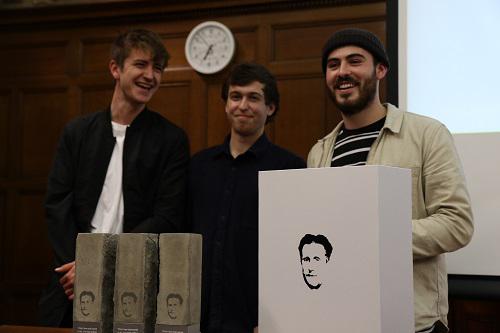
the ‘Orwell Prize’ for ‘good writing about politics’ 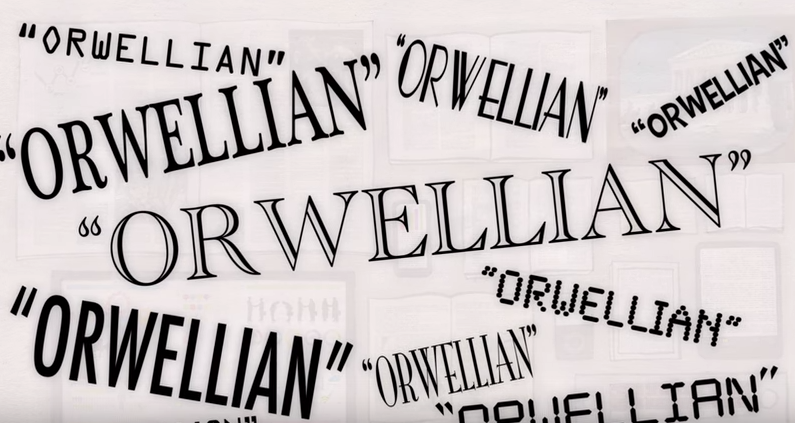
Exactly why this is the case is curious.
Perhaps the progressives citing Orwell are well-intentioned, but know little about him.
Or perhaps some of these ‘socialists’ know him all too well – as they are a continuation of his particular tradition of socialism.
In either case, a factual investigation and evaluation of Orwell’s actual life and activities should show him up for the man he was and what he represented.
That is the purpose of this article.
Family background and early life
Both Orwell’s mother and father’s families were European colonial aristocrats.
His great-great-grandfather was an Earl who owned several sugar plantations with over 200 slaves in Jamaica.
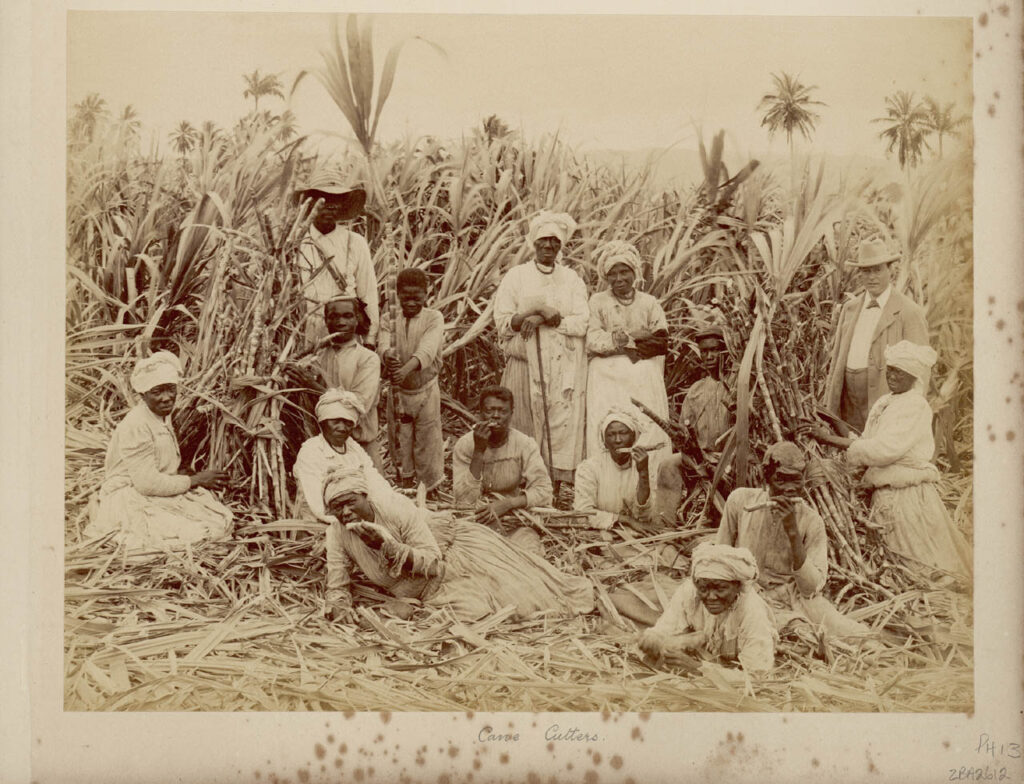
He was compensated for their “loss” in 1833 by the British government (using taxes reaped from colonial profits) when human slavery was made illegal by the British – in an attempt to forestall the powerful slave uprisings threatening the destruction of European colonies in the Caribbean, as had happened with Haiti.
Orwell’s mother came from a line of French colonial investors.
His mother’s sister would financially bail Orwell out multiple times in his life.
Orwell himself was born in the British Raj: colonial India which was the ‘Jewel In The Crown’ of the British Empire – from which they extracted an estimated $45 trillion.
His father was an opium inspector.
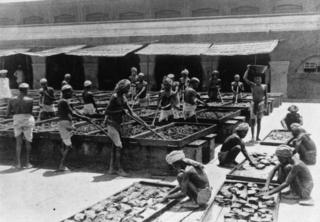
In the 1840s Britain launched the Opium Wars on China: a military invasion and occupation to impose on the Chinese (treaties signed under threat of British warships coined the term ‘gunboat diplomacy’) to buy opium sold by British merchants grown on colonial plantations in India as part of British ‘free trade’.
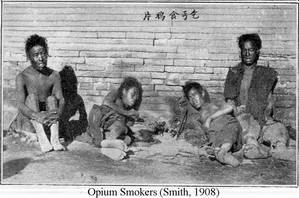
Tens of millions of Indians died in famines as farms were turned into opium plantations and 30% of the population of Chinese cities became strung out drug addicts as a result.
This process of looting the wealth of the Indian and Chinese civilizations was what propelled Britain to the top of the Imperial pyramid as world superpower for over 100 years.
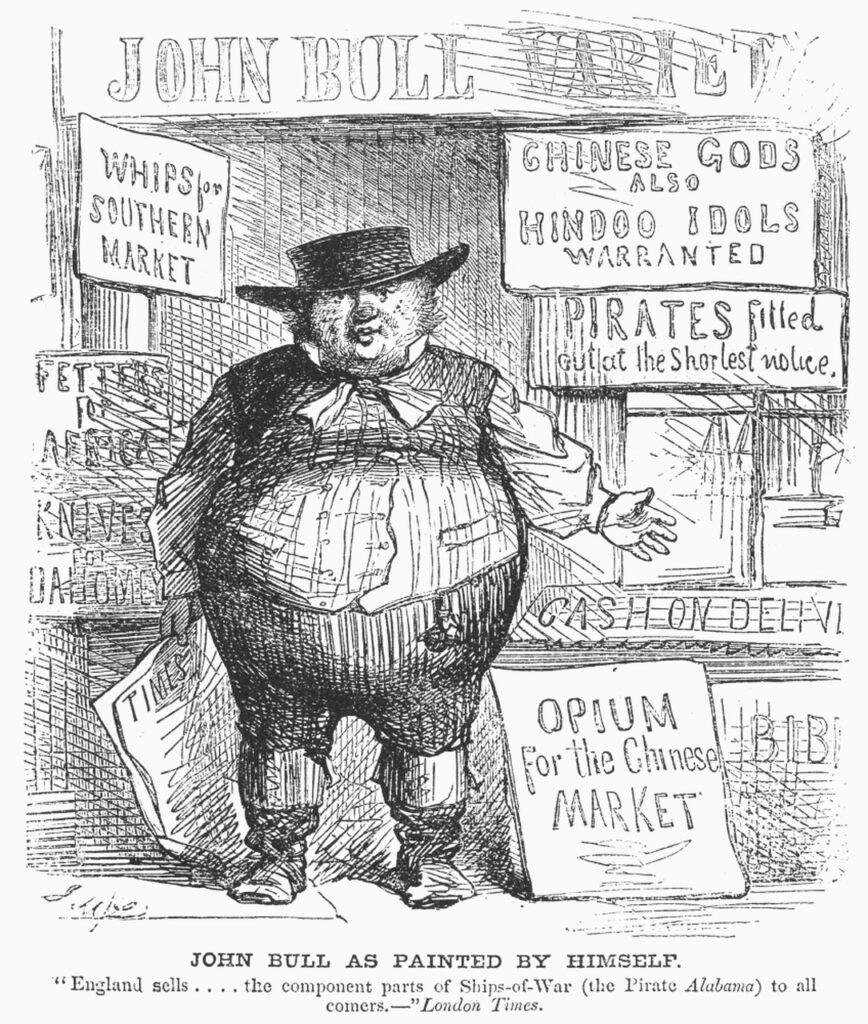
Orwell grew up with a team of maids and servants serving him and his family as lords and masters.
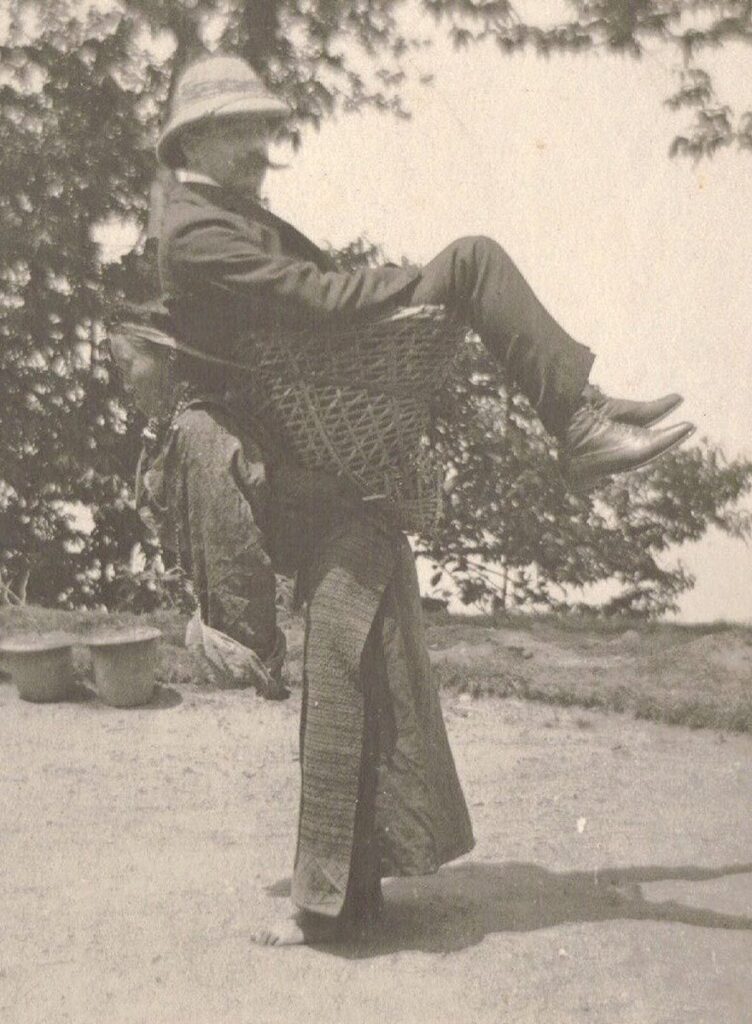
Throughout the rest of his life, even as a socialist, Orwell never regarded colonized peoples as his true equal.
In 1912 Orwell’s family moved to Britain.
Orwell says he took his “first sniff of English air” and never wanted to leave.
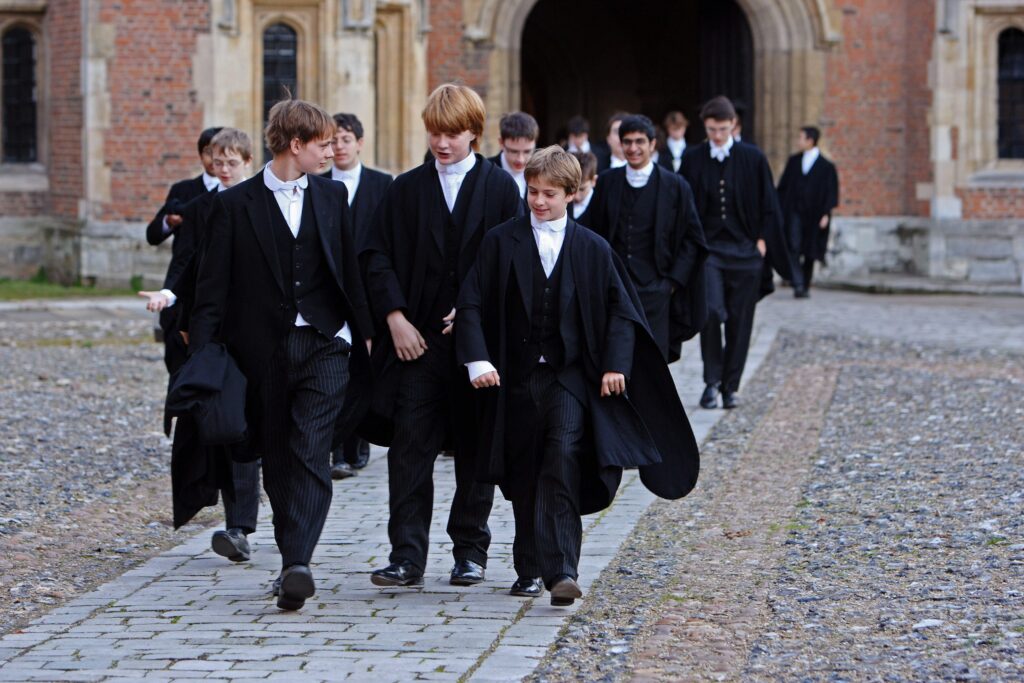
He was enrolled in Eton, the most elite boarding school in the country – they had so many alumni reaching the rank of Prime Minister that the school established a tradition to give the students the day off for the occasion.
After the outbreak of the Great War in 1914, the 11-year old Orwell wrote a poem supporting the war that would be echoed throughout the rest of his writing career.
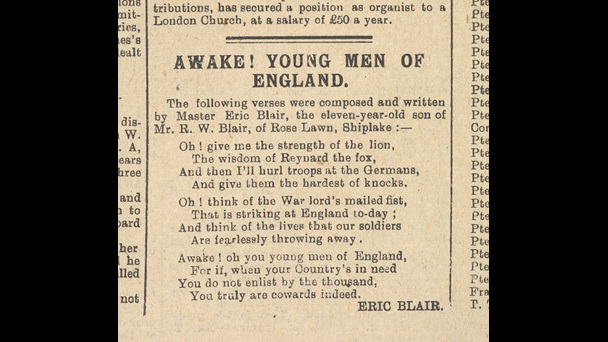
Condemning those reluctant to go to the slaughter fields as cowards, young master Orwell beseeched the ruling class generals to ‘hurl troops’ like board game pieces so their lives could be thrown away. Orwell did not fundamentally mature beyond this outlook, even when he died a 50-year old man.
After graduating from school Orwell took the decision as a 19 year old man to join Britain’s Indian Imperial police in Burma.
Burmese Daze
On arrival in Burma, the young British aristocrat was immediately made an officer and put in charge of maintaining law and order in a city of 250,000 people.
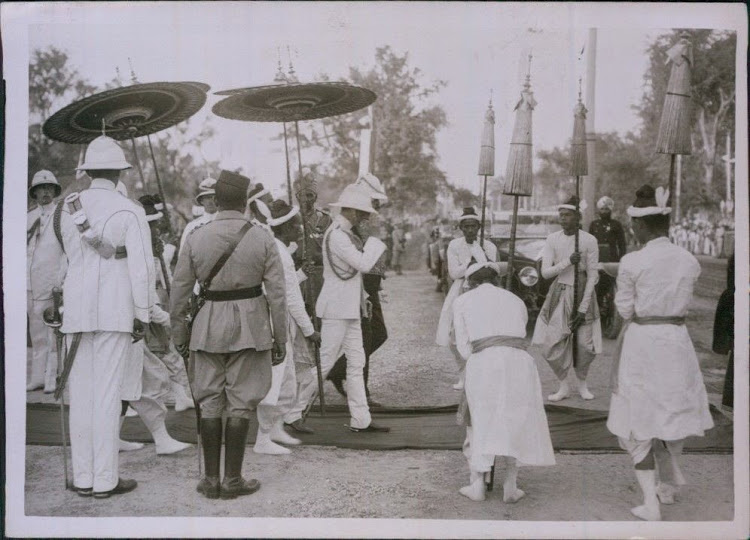
A nationalist movement, led by Buddhist monks, was growing in the region, and there were anti-colonial riots spreading in the country.
Young Orwell was given counterinsurgency training by the British colonial administration – techniques which he would use throughout his life, culminating in the older Orwell’s final collaboration with MI6 in the last months of his life
Orwell also had fun: an opium smoker and habitual brothel visitor during his six years in Burma, he wrote crude poetry about the young girls he slept with, paying them pennies. His acquaintances decades later said George would become wistful when talking about Burmese girls.
He of course had many servants, and wrote in his diary how he would beat them when they displeased him.
He mentioned that his 12-year old boy servant was beautiful and touched him like a woman, whatever this might mean.
When you have a lot of servants you soon get into lazy habits, and I habitually allowed myself, for instance, to be dressed and undressed by my Burmese boy. This was because he was a Burman and undisgusting; I could not have endured to let an English manservant handle me in that intimate manner. I felt towards a Burman almost as I felt towards a woman. Like most other races, the Burmese have a distinctive smell—I cannot describe it: it is a smell that makes one’s teeth tingle—but this smell never disgusted me. (Incidentally, Orientals say that we smell. The Chinese, I believe, say that a white man smells like a corpse. The Burmese say the same)
George Orwell
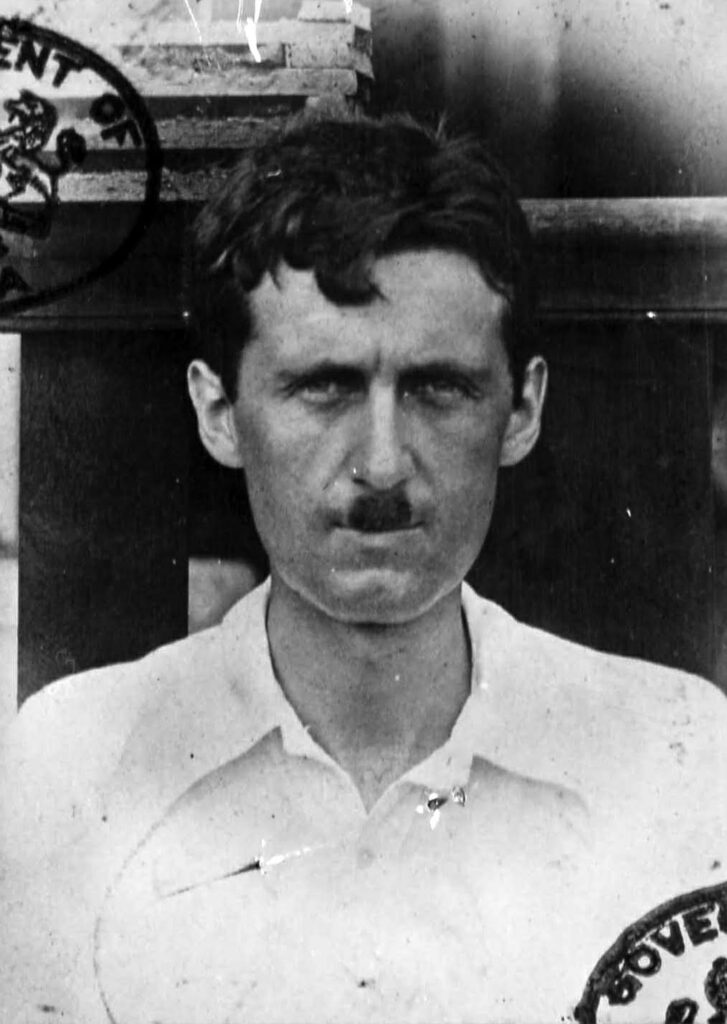
The lanky, awkward, Hitler-mustache wearing Orwell was known to react furiously when Burmese colonial subjects deigned to show him the proper respect. In one incident he beat a group of school boys in the street when their “yellow faces” “provoked” him.
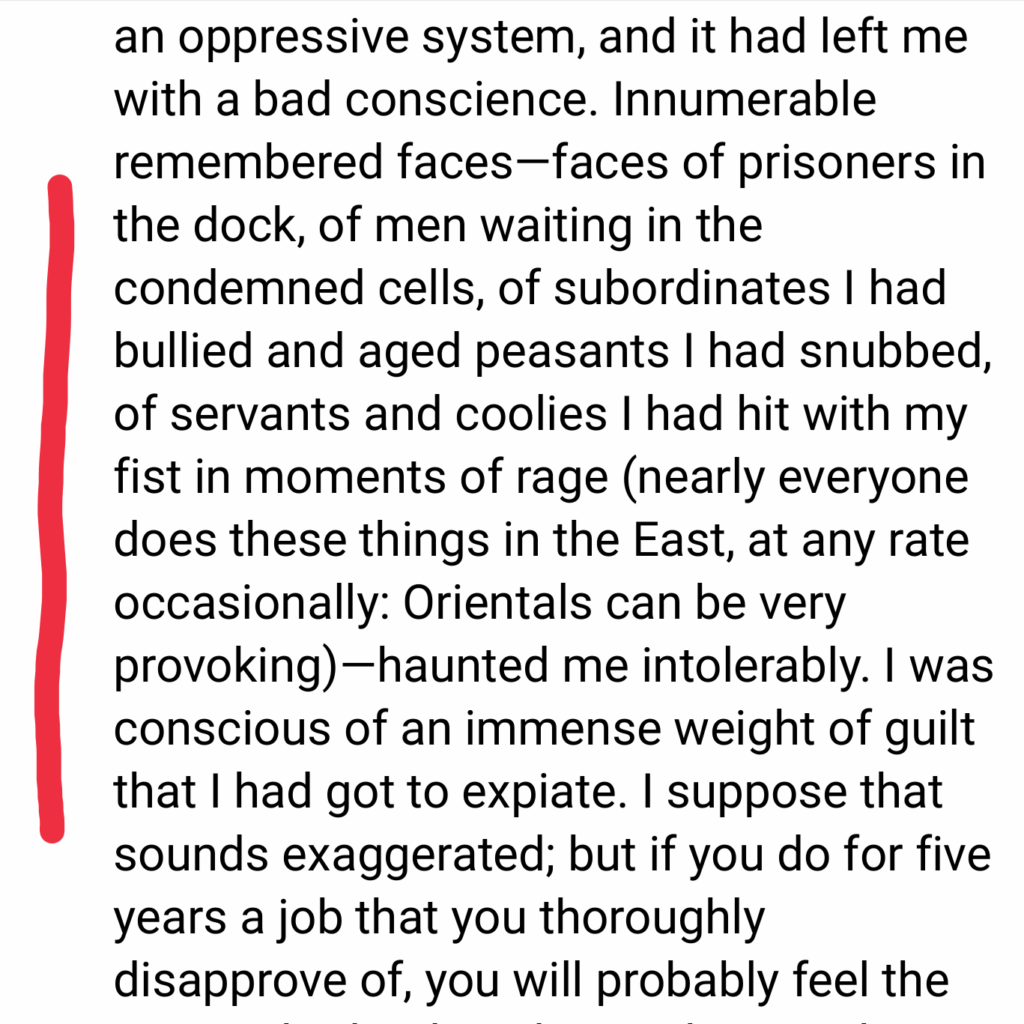
We can acknowledge from the three books he wrote about his time as colonial police officer that Orwell was mentally troubled and partially critical of Empire.
However, on critical examination, we see from his writings that his anguish does not come from the oppression of the colonised natives he rules over (the Burmese are never treated as human in Orwell’s anti-colonial writing, they exist as a mindless, savage mob or as crude racist comedy figures) but rather Orwell’s pain comes from his feeling that the natives are forcing him down to their animal level.
The argument is contagion. The Burmese are so vile that they infect the hero; he and his comrades should give up Burma simply to avoid infection. Of course, the story hints that they don’t have a choice; the Empire is doomed anyway. In fact, the Empire is an object of pity: “I did not even know [as a young man in Burma] that the British Empire is dying, still less did I know that it is a great deal better than the younger empires that are going to supplant it.”
‘War Nerd’ John Dolan on George Orwell
“The ghastly vulgarity of the third-rate characters who endure the heat and talk ad nausea of the glorious days of the British Raj, when fifteen lashes settled any native insolence, is such that they kill all interest in their doings.”
Review of Burmese Days in 1935
Back to England
After finishing his 5 year tour as colonial cop, Orwell decided he had a passion for writing and returned to England. He moved into his family home in London and tried pitching articles to various journals.
As for Orwell’s own poems, it would take a very brave critic to suggest that, seen in the round, they have any conspicuous merits. With a few flaring exceptions they are derivative, solemn and rather lifeless affairs.
The Orwell Foundation
He ended up writing a series of poverty tourist articles, dressing up as a tramp and smearing his face with dirt and befriending the homeless on the streets of London – in order to sell their stories to magazines.
After a few trips to the brothels of Paris this became his book “Down And Out In Paris And London”.
“Down And Out In Paris And London” was the first time ‘George Orwell’ was used as author: his birth name was Eric Arthur Blair, and he used a pseudonym to avoid his family name being associated with tramps.

I’m a Catholic meself. Dat’s to say, I ain’t been to confession for about seventeen year, but I still got me religious feelin’s, y’under stand. An’ dem convents is always good for a cup o’ tay…
Orwell’s impression of an Irish person in ‘Down And Out In Paris And London’
His racist descriptions of homeless Jewish people led to the first Jewish boycott of this book by Orwell, published in 1933 the year the Nazis came to power in Germany.
A publication wherein are references to Jews of a most contemptible and repugnant character. I feel bound to enter a very earnest and emphatic protest.
a Jewish boycotter of Orwell in 1933
However Orwell remained a deep anti-semite throughout his writings until his dying days.
“Why is it that the worst extremes of jingoism and racialism have to be tolerated when they come from an Irishman?”
Orwell on “anti-English racism”
Spain
Orwell was gradually positioning himself as a socialist (in 1937 the British Communist Party rebuked him for travelling to Lancashire to “see how the working class live” and focusing mainly on how they smell – while never mentioning their bosses making their lives miserable) and when civil war broke out in Republican Spain, Orwell announced to his new wife (a talented author herself – and the likely uncredited ghost-writer of Orwell’s ‘best’ book, Animal Farm) that he was leaving immediately for Spain.
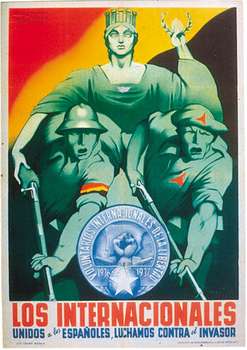
The International Brigades were organised by the Communist International; and the British Communist Party rejected Orwell for his anti-communist views.
So Orwell got a letter from the ‘radical’ Labour Party pressure group (the Independent Labour Party), joining a band of British trotskyites embedded in the POUM trotskyite militia in Spain.
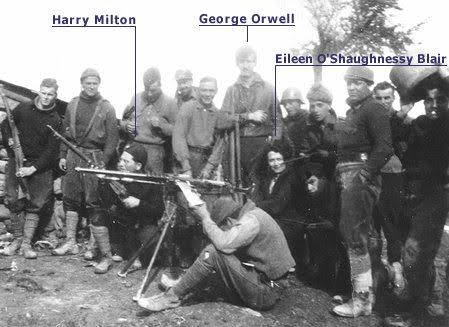
Many of Orwell’s British and other comrades within this militia eventually turned out to be British (and fascist) intelligence agents.
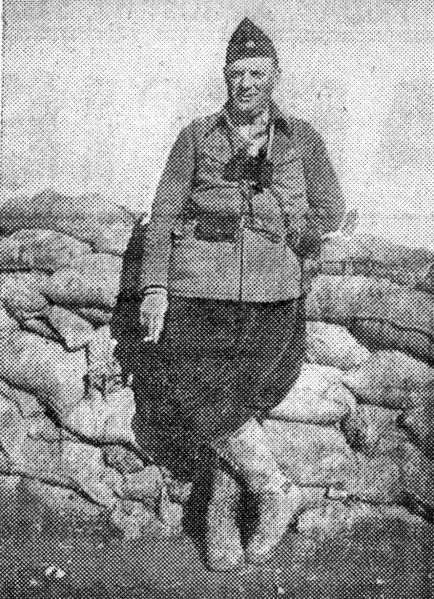
This characteristic – a secret Military Intelligence background – was also revealed later with the intellectuals and writers in Orwell’s social circle years later when he became a successful writer.
Orwell was posted to the Aragon front, and saw little action.
However he got wounded by a sniper and was sent to Barcelona for treatment.
While he was there the POUM militia launched a coup against the Republican government, and Orwell participated in it.
If Orwell fired any bullets in anger during the Spanish Civil War, it was as likely at Spanish Communists as fascists.
After the failed POUM coup, Orwell was briefly arrested by the Spanish republican police who found a copy of Hitler’s Mein Kampf in his possession.
After he was released Orwell lived the high life for a few weeks in Barcelona, eating in the most exclusive and expensive restaurants by day, scribbling graffiti on the walls by night while the Fascists closed in on the city.
Then he took a train to France and went back to Britain to write a book about Spain that would become for most English speakers the “definitive history” about the Civil War.
Orwell’s visa from Spain Film based on Orwell’s book
When Orwell arrived in Spain 6 months before, he gave his occupation on the visa as ‘shopkeeper’, but as he left he “pretended” to French border guards they he was an upper class gentleman on a business trip.
Her majesty’s secret socialist
When Orwell got back to Britain he wrote ‘Homage to Catalonia’ based on his experiences.
However his small left-wing publisher baulked at publishing the anti-communist text Orwell had written, as war against the Nazis loomed on the horizon.

Orwell took his book to publisher Frederic Warburg, an anti-communist who was later revealed as an MI6 and CIA asset who published the first English language translation of Mein Kampf in Britain.
In the last days of the Spanish Republic Orwell used his platform describing it as having fascist tendencies and celebrating it’s downfall. He eventually admitted he was wrong about this, and about the message in Homage to Catalonia. However he never retracted this kind of message in his books. This was not because he didn’t care about his image: he updated Burmese Days to be more politically correct, and quit his job at the BBC because it’s damaged his credentials as a “radical leftist”.
After the war, Warburg would help Orwell and similar anti-communist intellectuals form “socialist” magazines such as Tribune and Encounter as part of the MI6 global propaganda campaign known as the Information Research Department.
During this time Orwell referred to himself as a ‘Tory anarchist’, which is an accurate assessment of his beliefs throughout his life.
By this stage the British government had signed a neutrality pact with Nazi Germany, the 1938 Munich agreement.
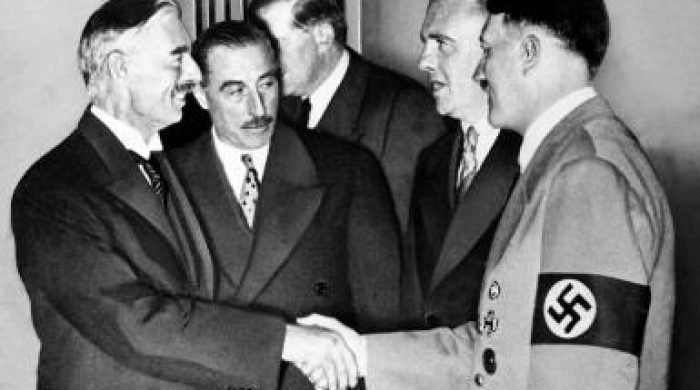
As a “patriotic socialist” Orwell supported peace with Nazi Germany at this time, and boasted to friends he would sabotage any war against them.
However when the USSR signed its own neutrality pact with Nazi Germany, Orwell flipped and became a vociferous advocate for war, lambasting pacifists with tirades in national newspapers.
“Pacifism is objectively pro-fascist. This is elementary common sense. If you hamper the war effort of one side, you automatically help out that of the other. Nor is there any real way of remaining outside such a war as the present one. In practice, ‘he that is not with me is against me’.”
Orwell attacking pacifists in 1940 with the same argument used against him when he attacked anti-fascists
State propagandist
When World War II kicked off,Orwell was first assigned to the Home Guard, then was sent back to his birthplace of India to produce a BBC Radio show aimed at supporting the war effort among educated Indians.

We do not know if Orwell said anything about famine happening in the Bengal province of India at the time, or the 3-4 million people who starved to death during it.
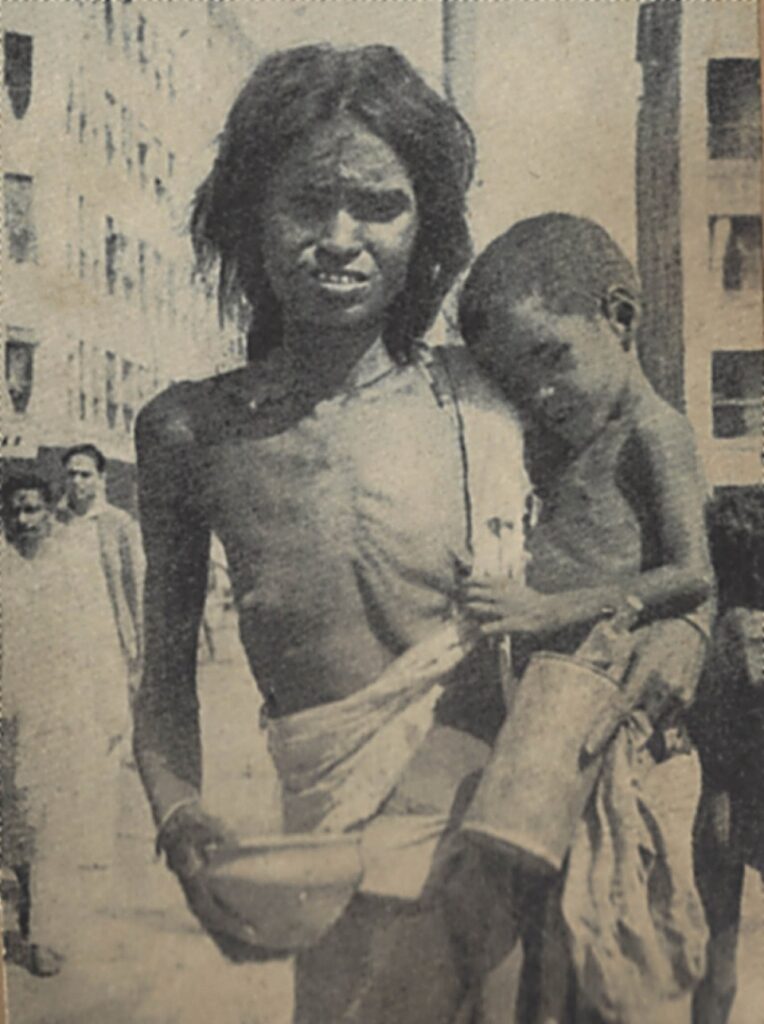
All recordings of the show were soon destroyed. Both Orwell and his BBC bosses complained about the low quality of his voice and the ineffectiveness of the radio show.
Orwell’s wife was working as a censor in the propaganda office back in Britain, and Orwell soon returned to join them.
He worked as a war correspondent with the MI6-aligned Guardian newspaper, when not writing inane articles about aspects of his beloved English culture, such as tea and scones and smutty postcards.
“English humour was being ‘purified’ for the benefit of a new, largely feminine, public”
Orwell complaining about “nancy boys” and political correctness in 1949
While the Soviets were defeating the Nazi war machine alone at Stalingrad, George was writing in his is nationally published column that “criticising Russia and Stalin” are the test of intellectual bravery.
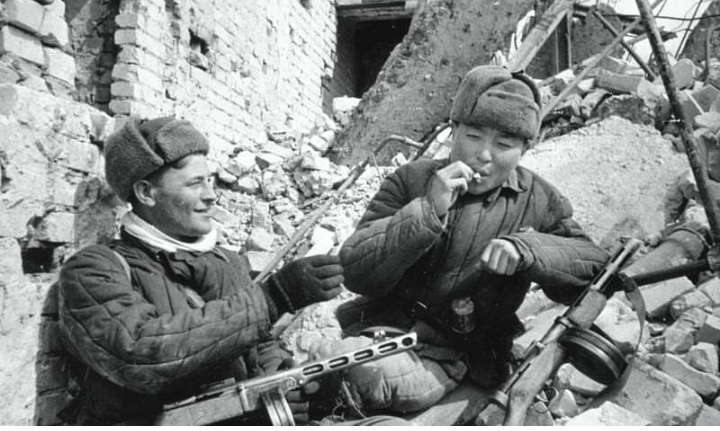
He was writing Animal Farm at the same time.
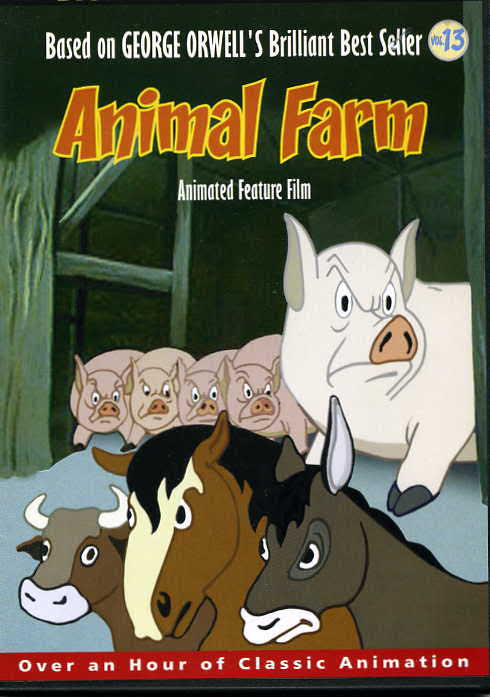
In fact the book was likely ghost-written by Orwell’s wife, who was a talented and interesting writer herself, as revealed by her letters.
The light-hearted fun of animal allegory matched her writing style, as opposed to Orwell’s dour and plodding writing characteristic of all his other works.
However she died not long before the end of World War II. Their marriage had not been a particularly happy one, with Orwell regularly cheating on her (with friends, acquaintances and prostitutes – sometimes non consensually) and she giving up her career to help his.
MI6 and the CIA realised they had a promising anti-communist novel in Animal Farm, and made sure it was well promoted and translated into dozens of languages.
The CIA bought the rights to film it and created a popular animation not long after Orwell died.
Animal Farm became Orwell’s first commercially successful book, and the newly widowed writer sent multiple letters to his female friends enticing them with wealth in exchange for sex.
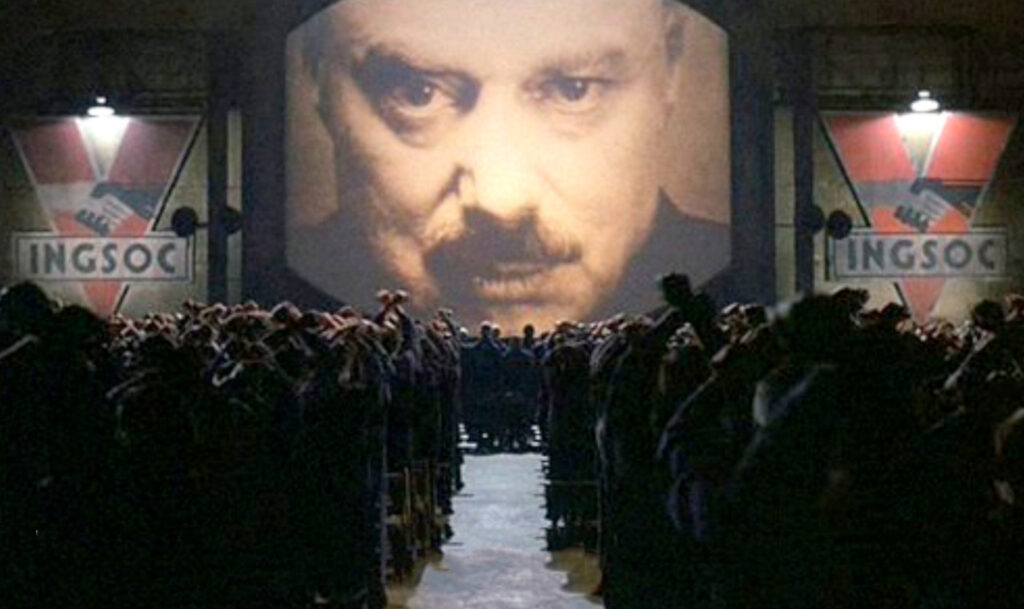
However his health was declining and he retreated to a remote Scottish Cottage to write his misanthropic book, 1984.
#TimesUp for Orwell?
“One of the surest signs of Joseph Conrad’s genius is that women dislike his books”
George Orwell
A subtle but key part of 1984 is its misogyny, with the only female character in it depicted as a brainless and sexually promiscuous vamp. Orwell’s “childhood sweetheart” recognised this character as based on herself; when she wrote to Orwell, he responded with a cold and accusing letter. She later revealed that Orwell had attempted to rape her when he was aged 17.
He had ruined what had been such a close and fulfilling relationship by trying to take us the whole way before I was anywhere near ready for that.
Jacintha Buddicom, childhood friend describing sexual assault by Orwell in 1921
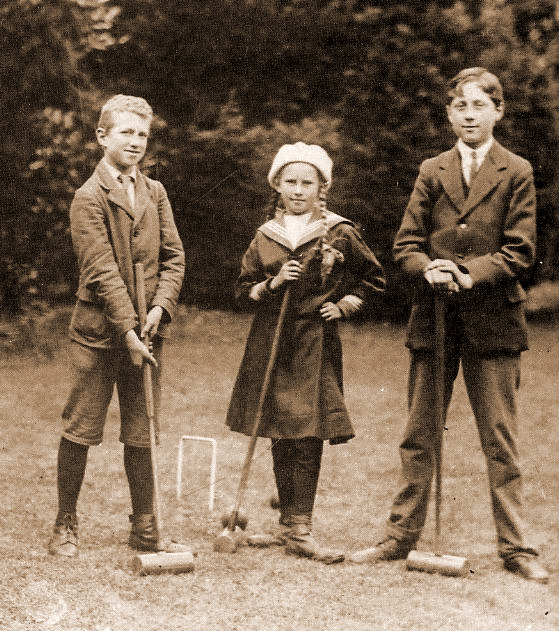
Orwell had several other accusations of sexual assault: one against a BBC colleague, another against a school teacher and many against his friends. Numerous of his sexual partners were from subservient positions; he slept with numerous secretaries for example. As a 27 year old man he gave a love poem to a 15 year old girl who he was a family tutor to. Orwell was also a serial “sex tourist” visitor to the poor and colonized world, where any sexual assaults would not have been recorded.
When I was young and had no sense/In far-off Mandalay/I lost my heart to a Burmese girl/As lovely as the day.
Her skin was gold, her hair was jet,Her teeth were ivory;I said, “for twenty silver pieces,Maiden, sleep with me”.
She looked at me, so pure, so sad,The loveliest thing alive,And in her lisping, virgin voice,Stood out for twenty-five.
“Ironic poem about prostitution” by George Orwell
An odd little incident from the Southwold days has Orwell emerging from a ditch near the River Blyth in pursuit of a girl named Dorothy Rogers who was making her way home over the common only for him to be chased away, and apparently beaten up, by her vengeful fiancé
DJ Taylor, biographer of Orwell
When we were out of sight of the buildings, we sat on the grass and he put his arms around me. It was an awkward situation. He did not attract me as a man and his ill health even aroused in me a slight feeling of revulsion. At the same time, the fact that he was a sick man, starved of intimacy with his wife, made it difficult for me to repulse him… He, no doubt, chose to think that I let him kiss me because I liked it. I did not.
Lydia Jackson, acquaintance of Orwell
I wonder if you were angry or surprised when I sort of made advances to you that night before you went away. … I thought you looked lonely and unhappy, and I thought it just conceivable you might come to take an interest in me, partly because I imagined you were a little older than you are. But I fully realise that I’m not suited to someone like you who is young and pretty and can still expect to get something out of life…. Of course it’s absurd a person like me wanting to make love to someone of your age. I do want to, but, if you understand, I wouldn’t be offended or even hurt if you simply say no. Any way, write and tell me what you feel.
Orwell to housemate Anne Popham
Orwell having “pounced” on Holden one afternoon in May 1941 after they’d been for lunch at the zoo. “I was surprised by this, by the intensity and urgency,” she wrote in her diary.
review of Inez Holden’s diary
Orwell’s biographer found several stories of sexual assault by orwell
We don’t know if Orwell fathered any children during his is sex tourism. However for his beloved English nation, he wanted abortion banned for “patriotic” reasons.
Any government, by a few strokes of the pen, could make childlessness as unbearable an economic burden as a big family is now: but no government has chosen to do so, because of the ignorant idea that a bigger population means more unemployed. Far more drastically than anyone has proposed hitherto, taxation will have to be graded so as to encourage child-bearing and to save women with young children from being obliged to work outside the home
George Orwell, “The English People”
Anti Communist
there is not much to choose between communism and fascism
George Orwell 1947
Orwell heavily “borrowed” (or stole) ideas from his wife or from Soviet author Yevgeny Zamyatin in writing his novels Animal Farm and 1984.
Another victim of Orwell’s intellectual theft was Gertrude Elias, a Jewish-Austrian refugee who fled the Nazis for Britain and met Orwell in 1941 when they were both working at the Ministry of Information.
A talented artist, she showed Orwell some of her drawings and storyboards for a fairy tale allegory about the Nazis as pigs taking over the farm. Orwell being a writer, she thought they could collaborate.
Orwell of course stole the idea, but flipped the meaning: instead of warning about Nazis, he targeted Communists and the USSR.
This was a pattern for Orwell: stealing communist work and perverting the meaning.
A famous example was “2 + 2 = 5” in 1984:
In the end the Party would announce that two and two made five, and you would have to believe it… The heresy of heresies was common sense. And what was terrifying was not that they would kill you for thinking otherwise, but that they might be right. For, after all, how do we know that two and two make four? Or that the force of gravity works?
2+2=5 in 1984
Orwell probably picked up this motif after reading a book of harsh criticism of the Soviet Union by former communist turned-trotskyite-turned neocon Eugene Lyons, which had chapters of the same title.
Orwell’s goal is to make communists look like brainwashed fools, who would stop believing in gravity if their leader told them to.
However the reason why the soviets are accused of this comes from a poster from 1931. The poster is a celebration: the goals of the five-year plan for food, factories and electrification had been achieved in only 4 years.
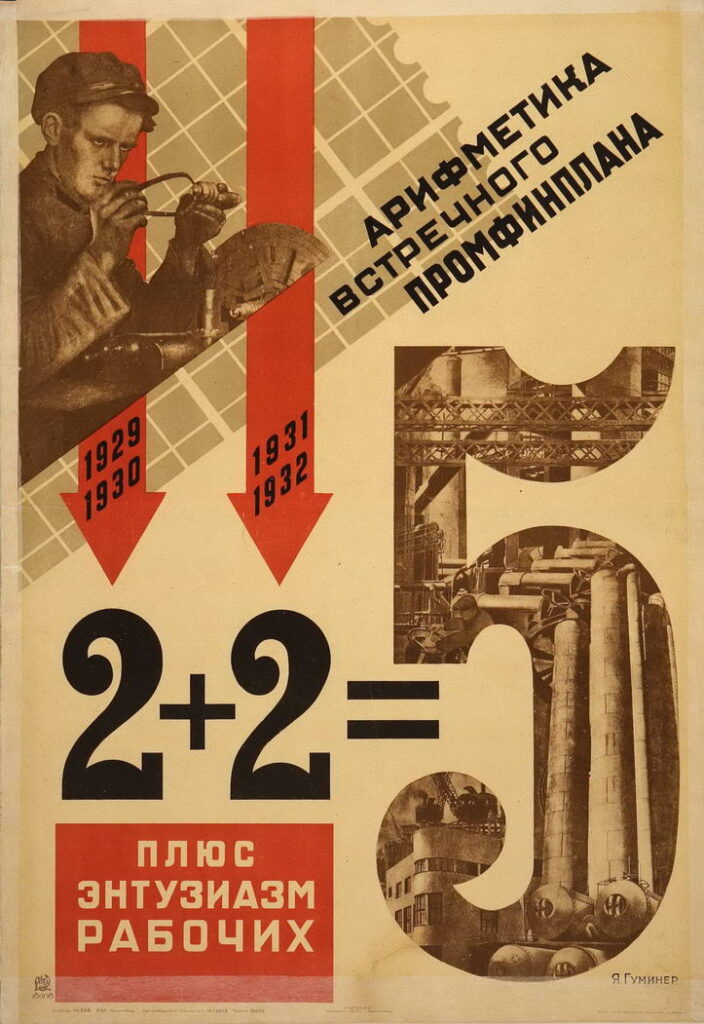
This is not the only purposeful mangling of Marxism that Orwell engages in. In letters to his wife he admits that he doesn’t understand Marx, joking that they have named their ill-treated dog after the socialist theoretician.
In 1984 the anti-Marxism becomes clear in its treatment of scientific socialism’s core mechanism: dialectical materialism.
Dialectics is the method for examining society as a struggle between classes, such as the contradiction between the capitalist class seeking to maintain Capitalism and the working class seeking to install Socialism.
According to Orwell in 1984, this outlook of society as a unity of two opposing classes is lampooned as:
“Doublethink means the power of holding two contradictory beliefs in one’s mind simultaneously, and accepting both of them. The Party intellectual knows in which direction his memories must be altered; he therefore knows that he is playing tricks with reality; but by the exercise of doublethink he also satisfies himself that reality is not violated. The process has to be conscious, or it would not be carried out with sufficient precision, but it also has to be unconscious, or it would bring with it a feeling of falsity and hence of guilt.“
As you can see, the class-conscious marxist is ridiculed as a depraved ‘doublethinker’ who has forced their brain to see ‘blackwhite’ and other delusions which orwell has conjured up.
A further attack on Marxism are the famous lines which Orwell puts in the mouth of ‘Big Brother’:
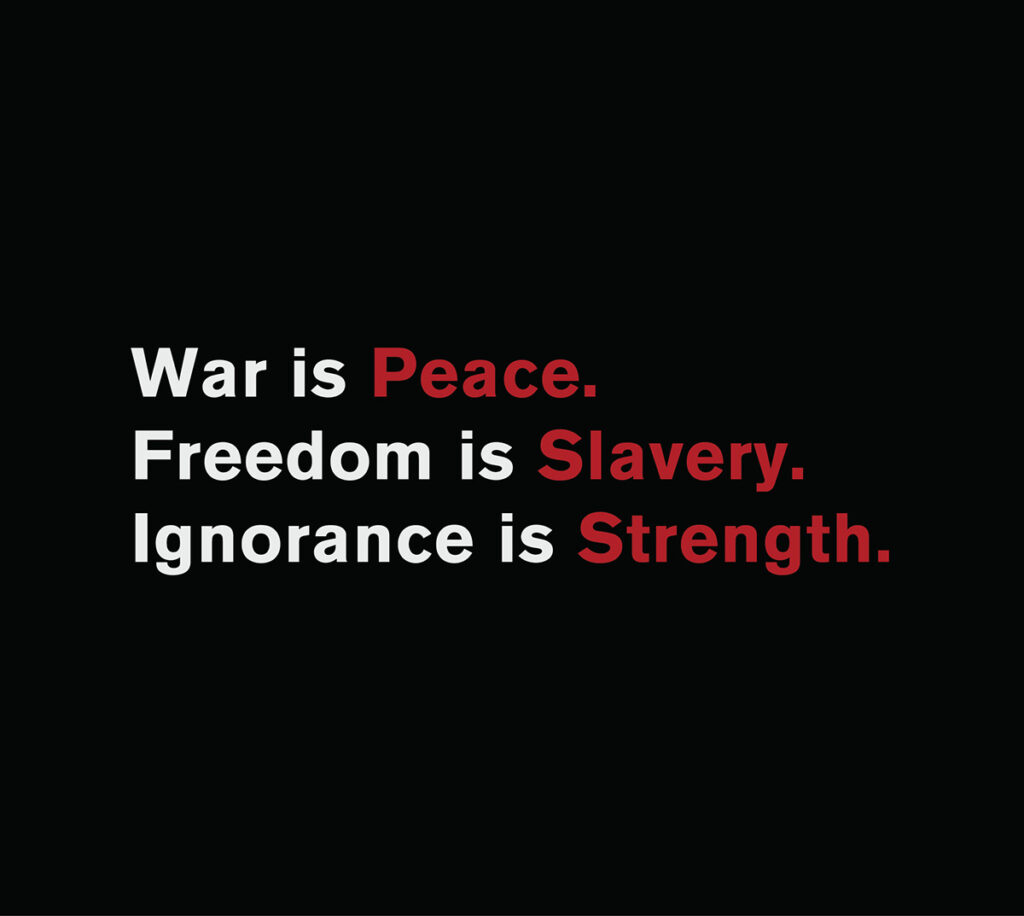
These ‘dystopian’ words are Marxist critique of capitalist society, after being put through Orwell’s mental meat-grinder!
‘War is Peace’ – imperialist class war buys social-peace in the core capitalist nations for the ruling class.
‘Freedom is Slavery’ – liberal slaveowners (like Benjamin Franklin and Thomas Jefferson) were the architects of ‘capitalist freedom’ that their class enjoys today.
‘Ignorance is Strength’ – the strength of the capitalist class lays entirely on maintaining the working class ignorant about their own power and historic mission.
Aside from making a mockery of scientific socialism, the tool for liberation of the working class, Orwell spends much of his writing mocking the working class themselves.
In Animal Farm, the working class (represented as horses) are depicted as follows:
“Their most faithful disciples were the two cart-horses, Boxer and Clover. These two had great difficulty in thinking anything out for themselves, but having once accepted the pigs as their teachers, they absorbed everything that they were told, and passed it on to the other animals by simple arguments.”
His hate for the colonised working class was even more explicit. About his time in Burma orwell wrote:
“As a police officer I was an obvious target and was baited whenever it seemed safe to do so. When a nimble Burman tripped me up on the football field and the referee (another Burman) looked the other way, the crowd yelled with hideous laughter. This happened more than once. In the end the sneering yellow faces of young men that met me everywhere, the insults hooted after me when I was at a safe distance, got badly on my nerves. The young Buddhist priests were the worst of all. There were several thousands of them in the town and none of them seemed to have anything to do except stand on street corners and jeer at Europeans.”
About the masses of Marrakech, Orwell wrote:
“When you walk through a town like this–two hundred thousand inhabitants, of whom at least twenty thousand own literally nothing except the rags they stand up in–when you see how the people live, and still more how easily they die, it is always difficult to believe that you are walking among human beings. All colonial empires are in reality founded upon that fact. The people have brown faces- besides, there are so many of them! Are they really the same flesh as yourself? Do they even have names? Or are they merely a kind of undifferentiated brown stuff, about as individual as bees or coral insects? They rise out of the earth, they sweat and starve for a few years, and then they sink back into the nameless mounds of the graveyard and nobody notices that they are gone.”
The final gruesome scene from 1984 involving the main character being ‘broken’ by rat torture was likely inspired by the propaganda campaign by early Nazi leader Dietrich Eckhart ascribing such atrocities by the “Judeo-bolsheviks” done to “Russian Christians”
The List
Once a whore always a whore
Orwell debouching the New Statesman editor, who he later reported to MI6
While he was writing 1984 Orwell was regularly visited by a social circle of intellectuals, both “socialist” and reactionary, many of whom had intelligence ties. One of these colleagues was “socialist”-turned-neocon Stephen Spender, despite Orwell despising to him as a ‘pansie’ due to his homosexuality.
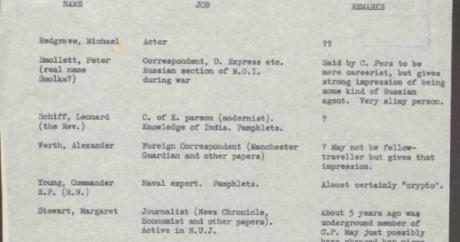
This brings us to Orwell’s famous list.
Being a “friend” of Orwell, as well as a fellow so anti-communist “socialist”/neocon and intellectual working for British military intelligence, did not save Stephen Spender from making the list Orwell handed over to MI6 in the last months of his life.
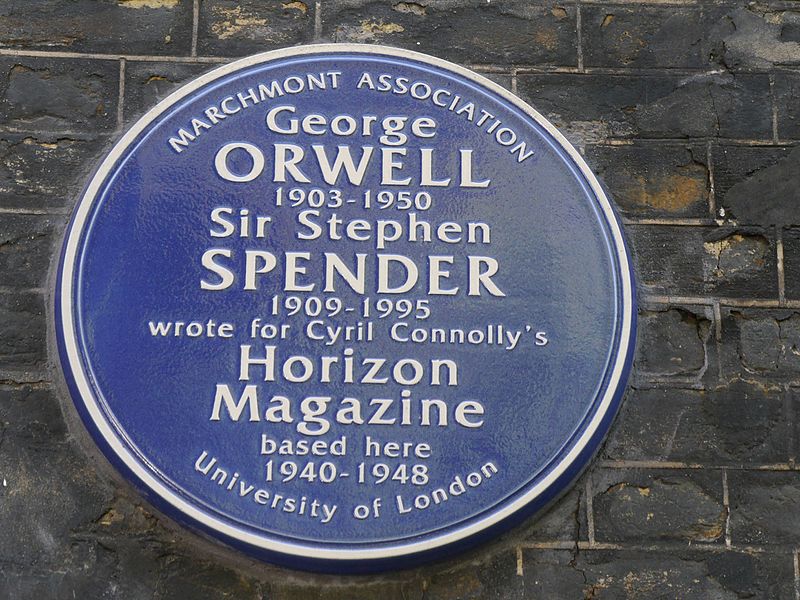
One of Orwell’s contacts was Celia Kirwan, a researcher and agent at the Information Research Department – which was a global anti-communist propaganda project run by British military intelligence targeting both the Western public and the colonised peoples of the Global South.
The IRD was set up by the “progressive” Labour government of Clement Atlee in 1948. Their first mission was to hammer into the public’s head that the Nazi death camps which the Soviets had liberated were not as bad as imaginary Soviet death camps. This was to distract from the concentration camps and genocide the British where inflicting on on Malaya/Malaysia and Kenya at that time.
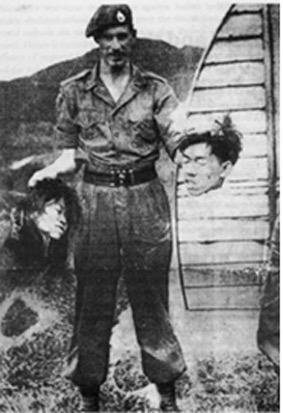
Kirwan’s boss at the MI6 IRD was “historian” Robert Conquest creator of much “black propaganda” about the Soviet Union – the “Great Terror” to describe the 1930s was one of his inventions.
She was one of the women who Orwell wrote to, asking for marriage and offering to bequeath money.
She rejected marriage, but in the last few months of his life was a regular visitor to Orwell’s cottage, where they worked on propaganda strategies.
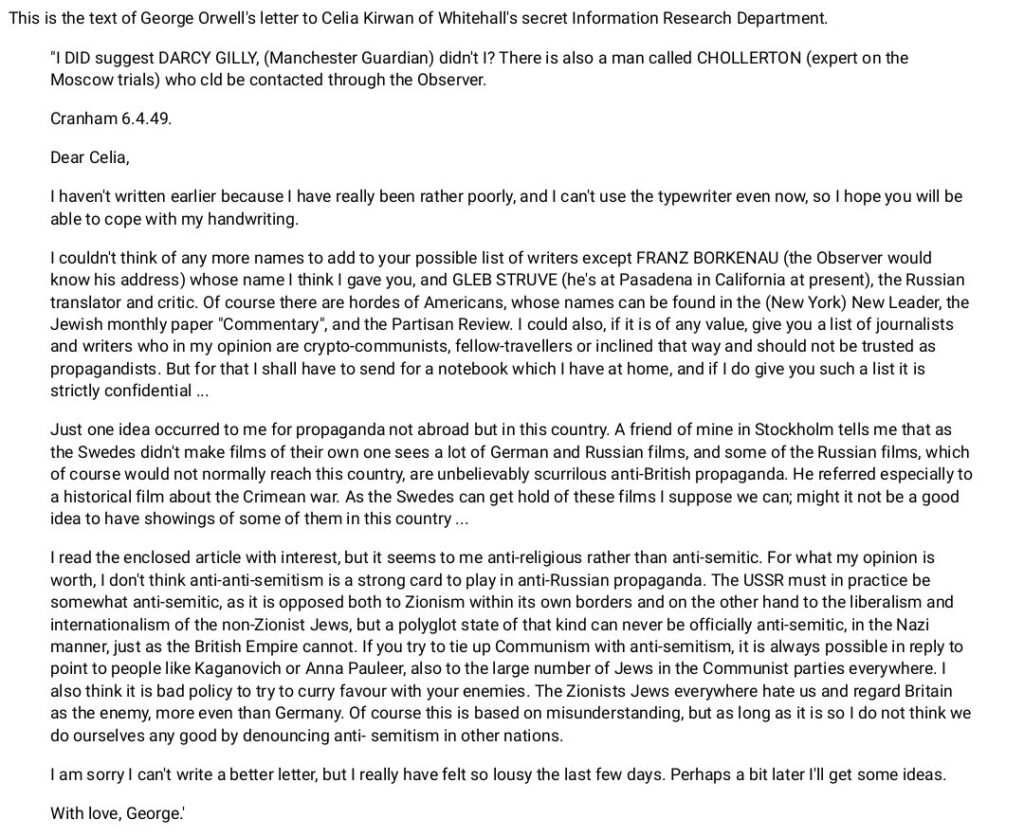
It was to her that Orwell handed over his list which he had compiled throughout his life.
As a cop trained in intelligence work from age 19, Orwell kept detailed notes on contacts and popular figures, be they “friend” or foe.
The list Orwell handed over to his MI6 handler contained at least 130 names (he may have handed over 3 different lists with hundreds of names) with notes – a third of which are still a British state secret to this day.
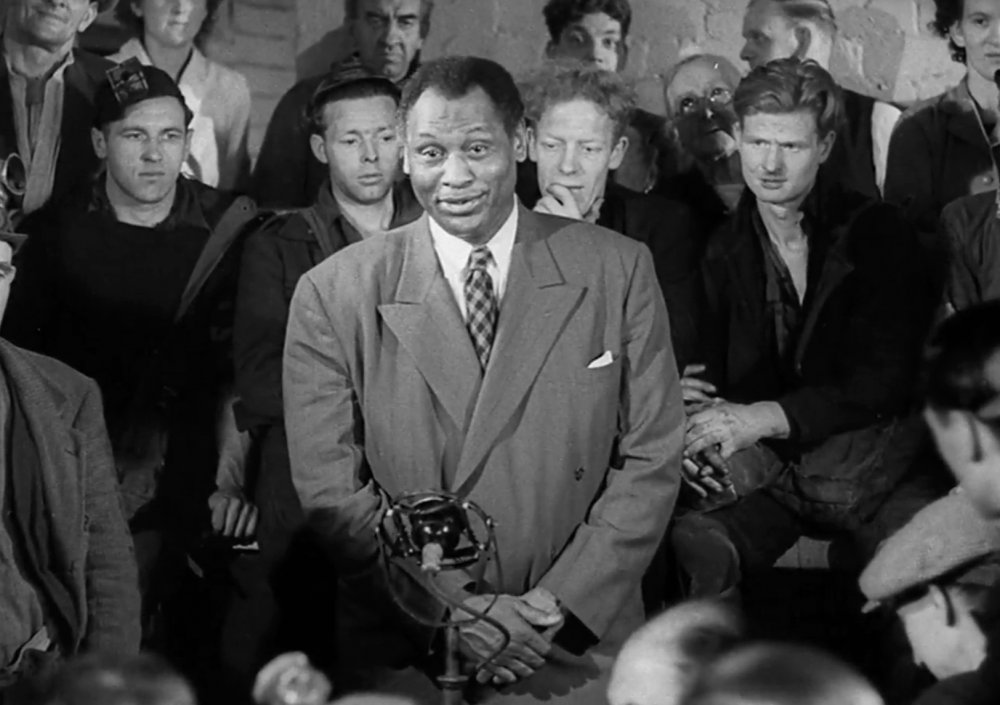
Those that have been publicly released reveal Orwell’s bias. Ignorant adjectives such as ‘anti-white’, ‘Irish.’ and the frequent ‘Jew?’ are liberally sprinkled. His entire body of work, full of contempt and derision towards the colonized, Irish and Jewish people can be consulted in case this bigoted policeman’s report is not clear.
Orwell died not long after passing his notes on to MI6.
The Canonisation of St George
America has never had a ‘Department Of Culture’ to support artists, writers, musicians and other cultural workers – except ironically for a CIA front called the Congress of Cultural Freedom.
This ‘congress’ was how the CIA managed a network of foundations and NGOs to promote Capitalist Art and Western Supremacy among intellectuals.
Philosopher Bertrand Russell, theorist Michel Foucault, artist Mark Rothko, filmmaker Cecile B DeMille, feminist Gloria Steinem were some of the many cultural figures funded and brought to prominence by the CIA.
Also established by the CIA Congress of Cultural Freedom project in the US, the Information Research Department in the UK and similar operations worldwide was a library of progressive and ‘socialist’ magazines aimed at intellectuals – all with one united cardinal rule: they had to be anti-communist.
[Tribune] are obviously badly on the rocks, and I said that in the interests of the Cold War, they should be kept going as a counterblast to the New Statesman.
Malcolm Muggeridge of MI6 (also “socialist”, rapist and friend of Orwell) to Tribune editor (also Zionist, MI6 agent and friend of Orwell) Tosco Fyvel upon British military intelligence buyout of the socialist journal in 1950
The man who conceived of the Congress of Cultural Freedom was another “former communist” CIA agent, Arthur Koestler. Orwell was good friends with him; like Orwell, Koestler was also an accused rapist. Koestler was himself married to the twin sister of Orwell’s MI6 handler, Celia Kirwan.
Orwell was in fact a key figure in this nexus. In 1945 he helped set up the “Freedom Defence Committee”, anti-communist rival to the powerful communist-led human rights network at the time. It was through this that he met Arthur Koestler. Together they strategized the concept of the the Congress of Cultural Freedom. Together they attempted to form a human rights group similar to Amnesty International which, was established 15 years later – by a lawyer who was also an FBI informant on radical groups in the US, spying on the Black Panthers and assisting in the assassination of Fred Hampton.
Orwell, Koestler and Bertrand Russell together wrote a manifesto for an anti-communist “new left”. This was very similar to the 2006 “Euston manifesto” which supported “progressive” imperialism against “authoritarian third world dictatorships”. The signatories of the Euston manifesto were, like Orwell’s clique, Guardian commentators; and just as Orwell’s clique were secretly organised to the MI6 Information Research Department structure, the Euston manifesto commentators are today are organised in MI6 Integrity Initiative “clusters”. New names, same old aims.
Orwell was a central figure in this formation, however his early death just as the Cold War was taking off, meant that this life long-cop and agent never took his mission to the next stage. Instead his social circle of “friends” went on to be successful writers, editors, founders and other agents in this cultural war-machine.
Orwell himself became something of a Patron Saint of these propagandists, the cartoon made of his book Animal Farm was not only the first animated film made by the CIA, but the first feature length British cartoon ever made.
Orwell’s wife Sonia met him while working at Horizon magazine
Orwellianism
Orwell today is a standard staple of school curriculums, and both young children and grown academics are taught to put aside critical thinking facilities when evaluating what Orwell stood for.
However when we lay out and assess the private thoughts (shown in his personal diary and private letters), his public beliefs (taken from his many books and articles) and his actions (the various projects, campaigns and activities he participated in) we can sum up the following themes that Orwell stood for: misogynist, homophobe, racist, Imperialist, anti-communist, poverty-tourist, state-propagandist, hypocrite and bad writer.
Orwell’s statue stands outside the BBC headquarters today. One wonders what private joke is being shared among the British elite.
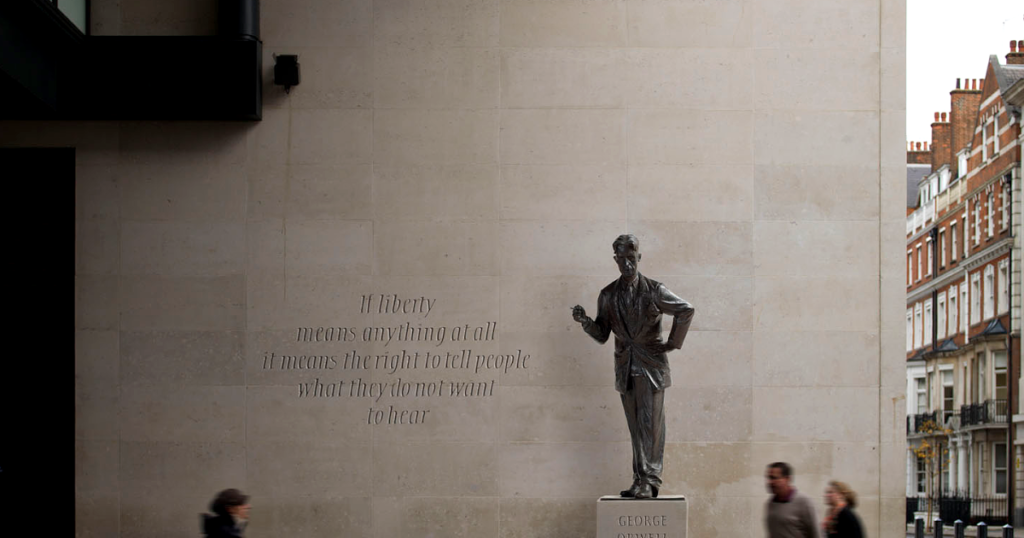

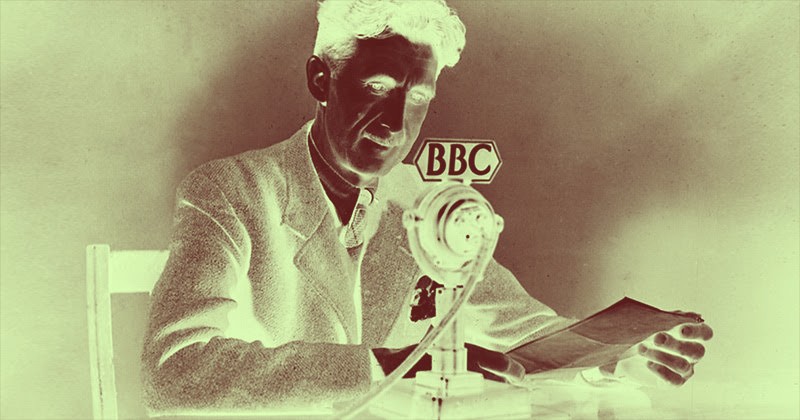
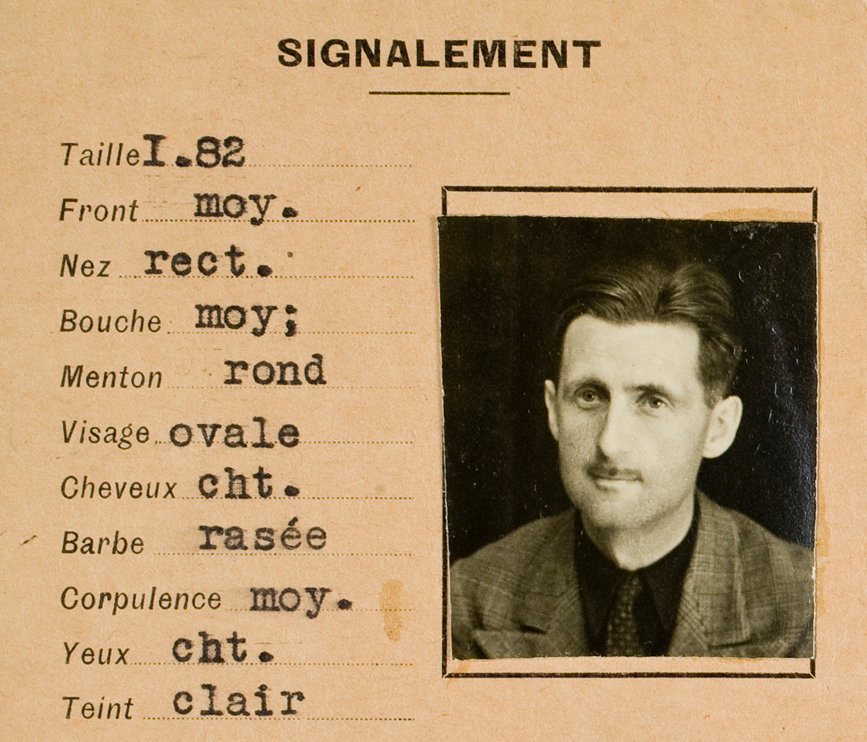

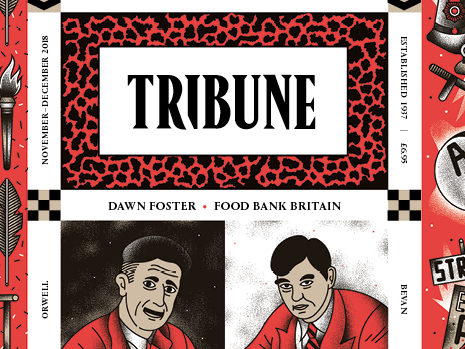
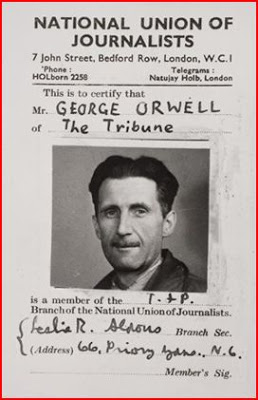
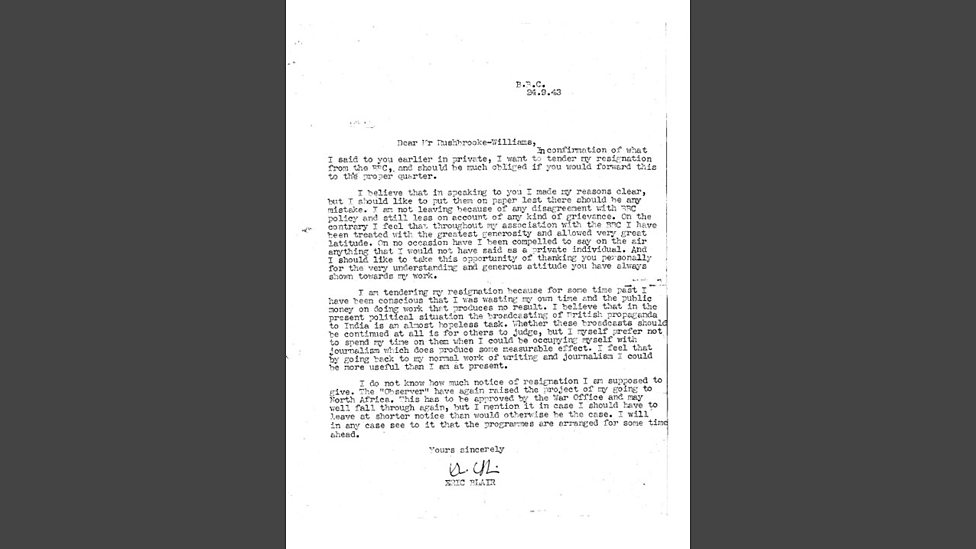
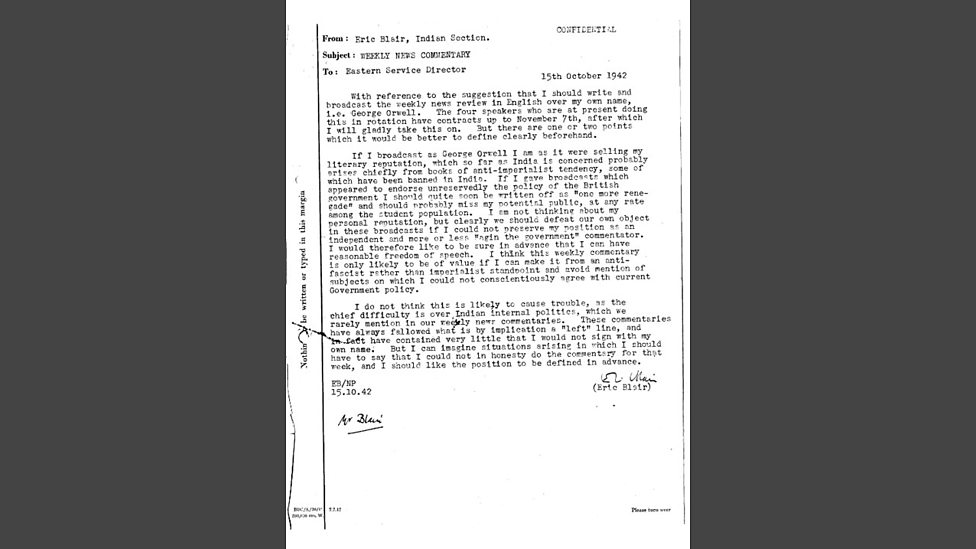
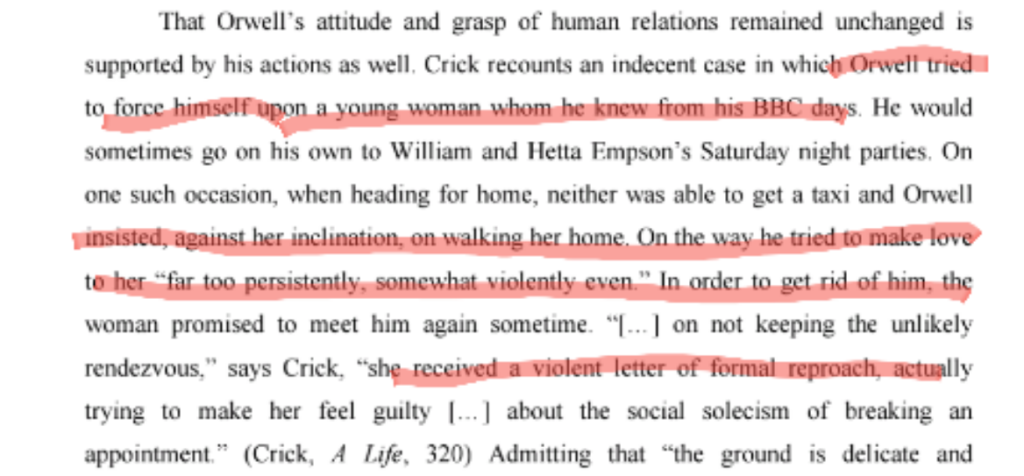
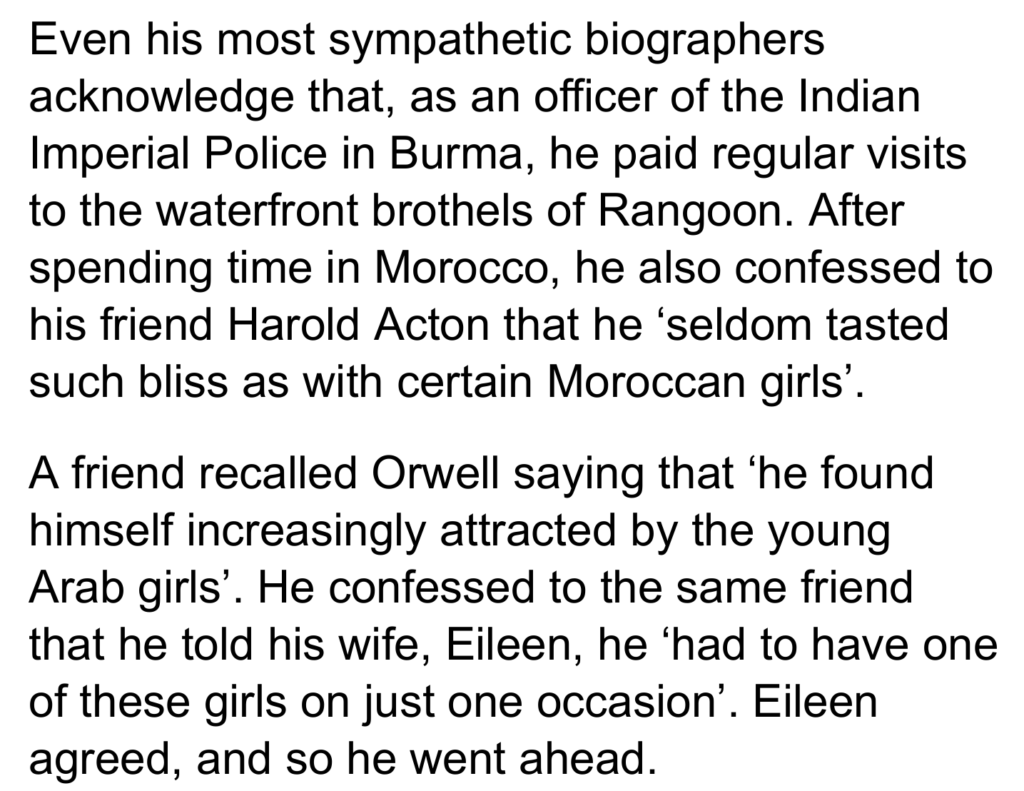
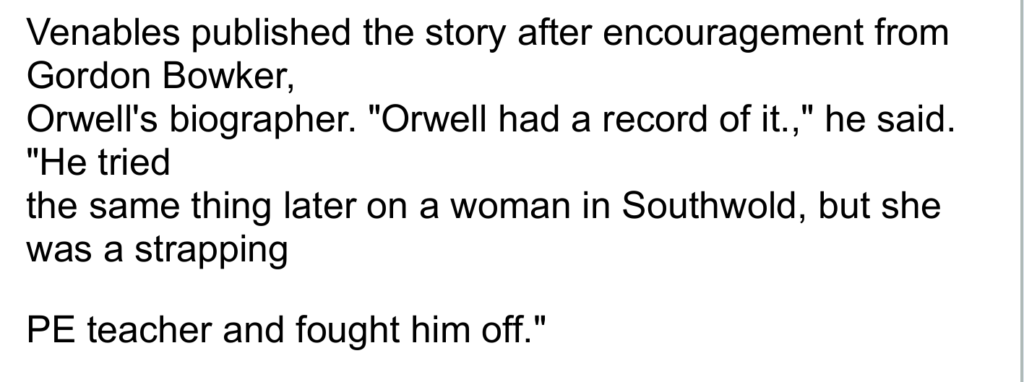
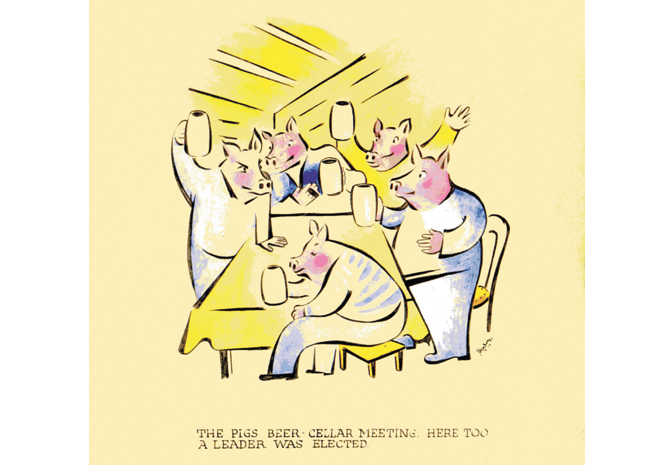
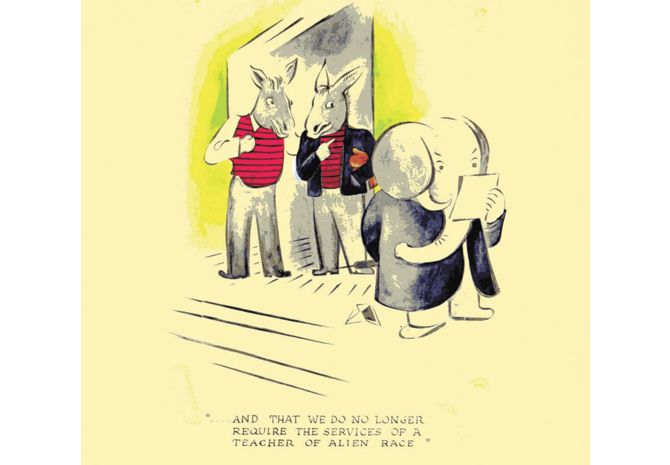
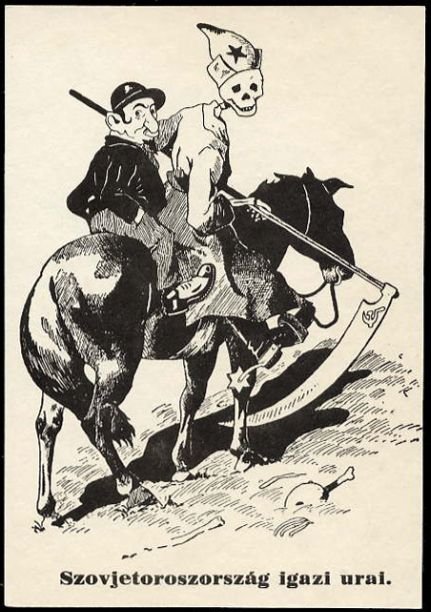
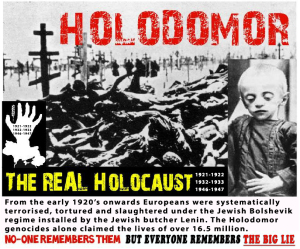
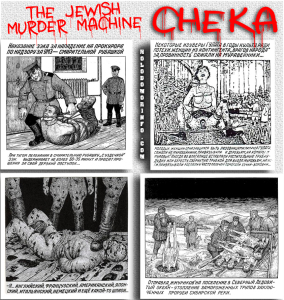
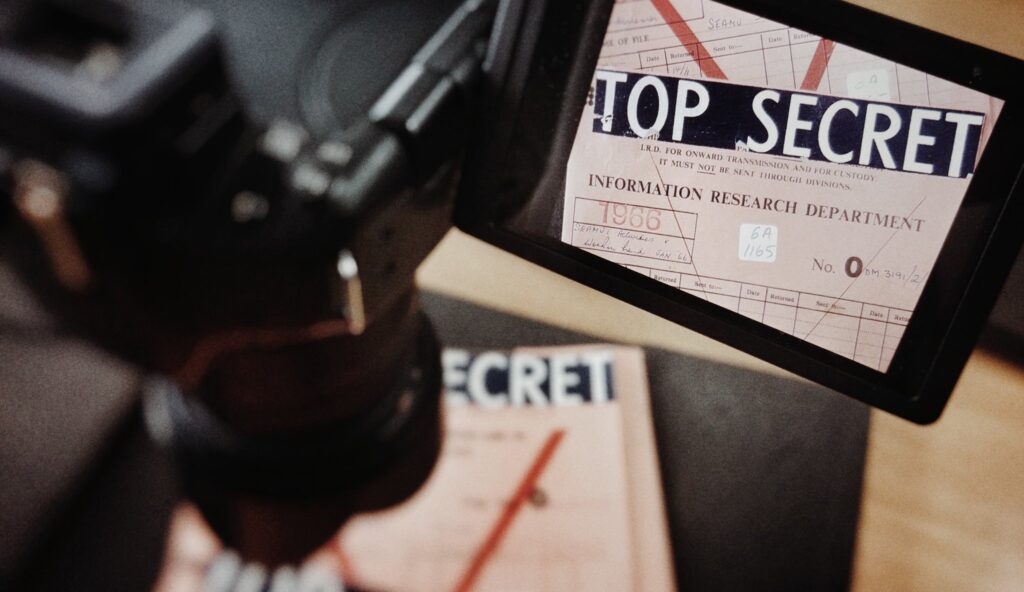
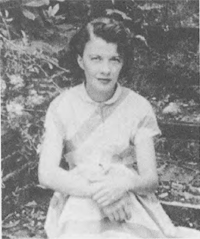
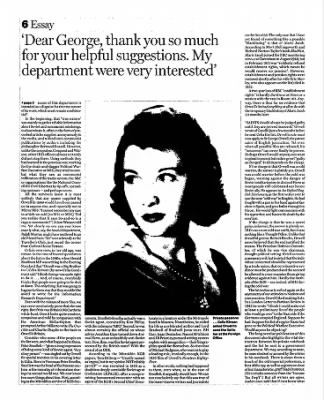
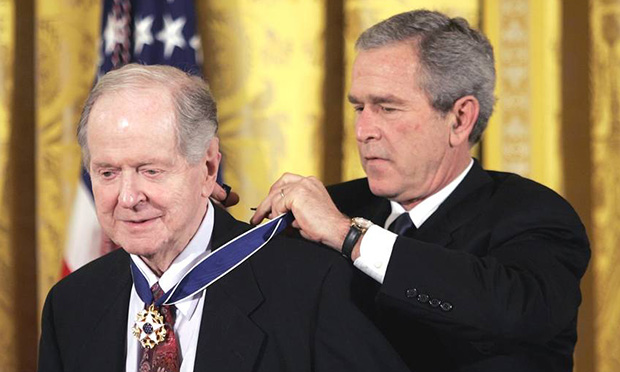

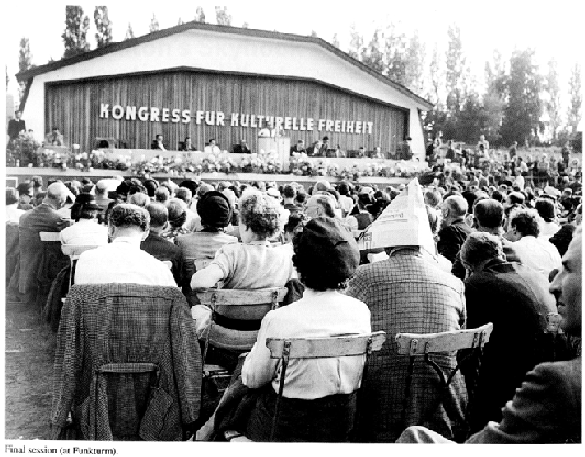
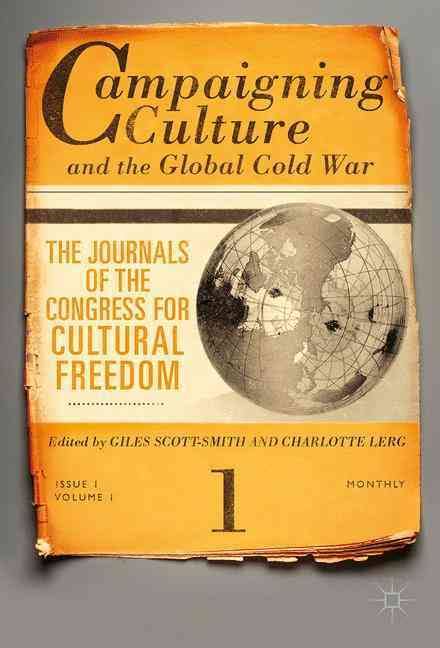
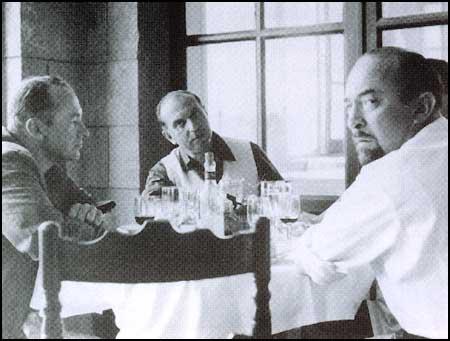
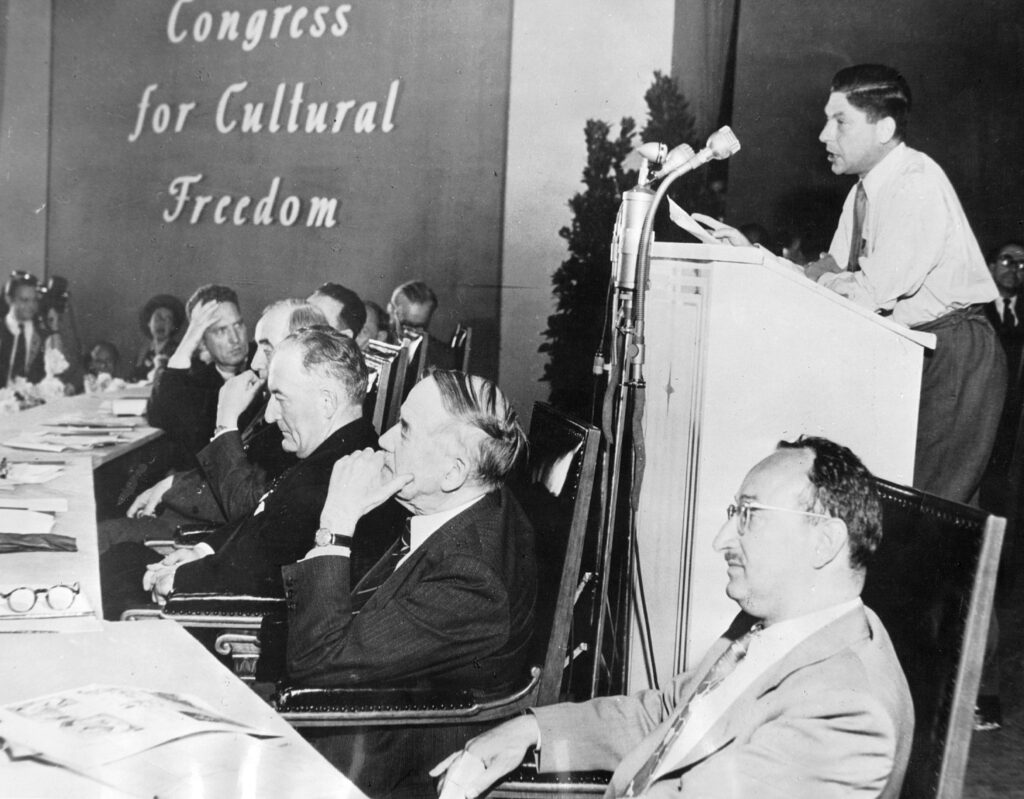
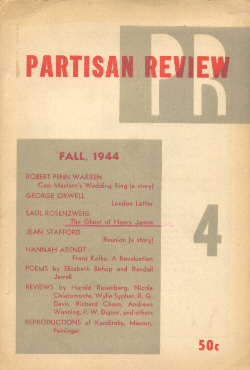
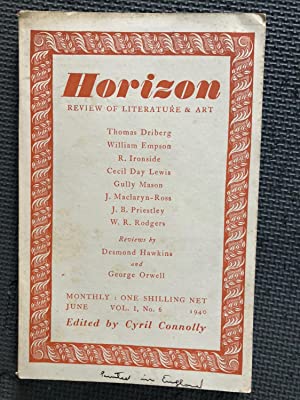
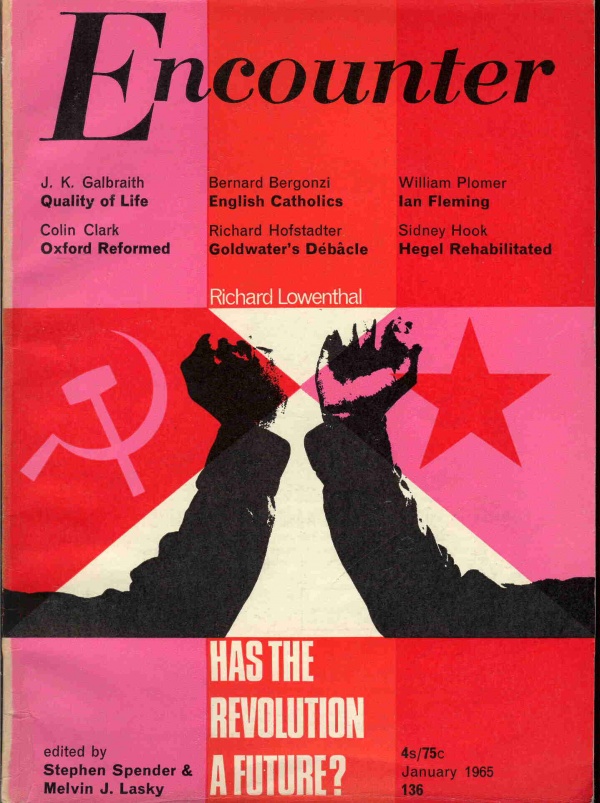
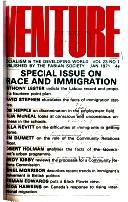

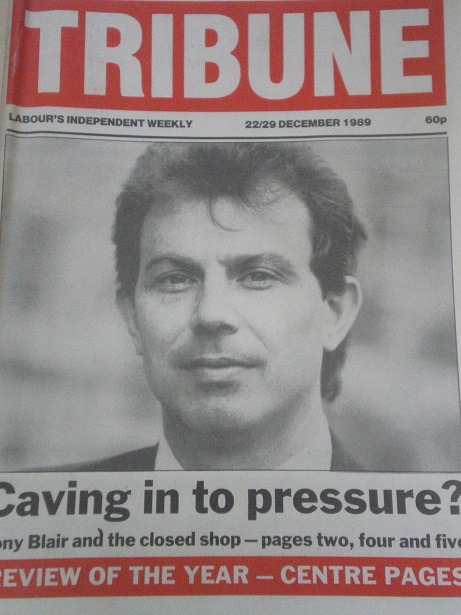
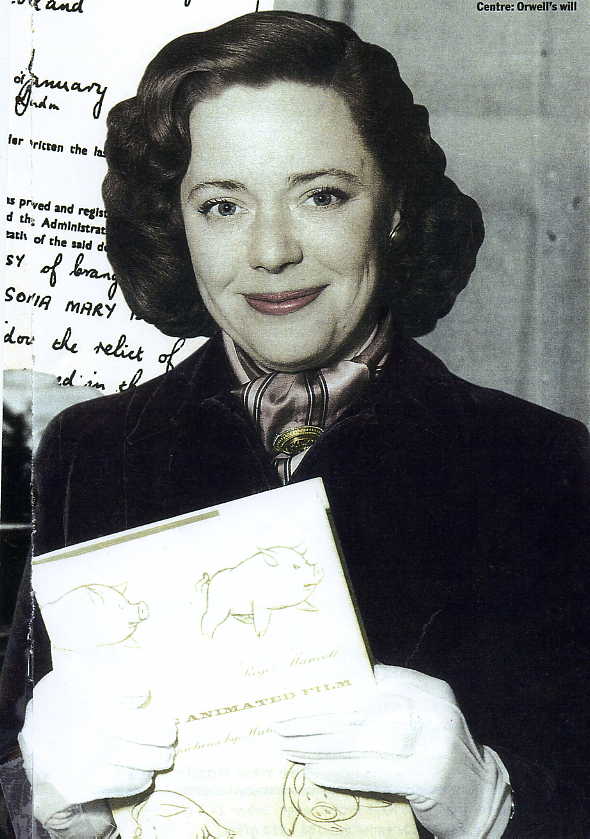
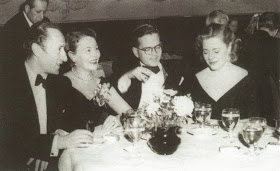

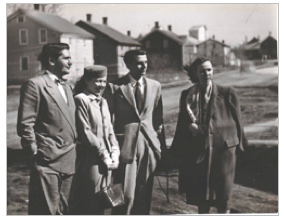

2 replies on “Unmasking St George”
This is the best explanation of Orwell’s list that I’ve seen: https://www.nybooks.com/articles/2003/09/25/orwells-list
My quick googling doesn’t bring up anything that suggests Orwell’s wife wrote Animal Farm. Did I miss something, or is that purely starryplough’s notion?
As for rightwingers exploiting Orwell after his death, he was fiercely anti-Stalin, so it’s natural that rightwingers would exploit it. That does not invalidate his work.
His work invalidates itself with its anti-USSR (1917-1953) stance and actions against the workers’ movement.